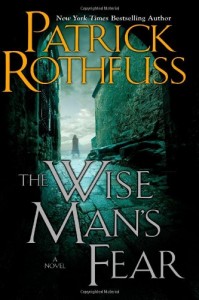One of the very few problems with the Malazan Book of the Fallen is that, like The Decline and Fall of the Roman Empire, the title of the series is kind of a massive spoiler. But since it’s ten books long, and with approximately that many ancillary books published or on the way, I suppose it’s pleasant to at least have an inkling of what you’re getting into. And yet, at no point (well, okay, at very few points) does the series wallow in its bleakness. The death and tragedy serve as contrast for the heights that humankind (well, personkind, as there are lots of non-humans around, and most of them reasonably immortal to boot) can aspire to. Toll the Hounds alone covers camaraderie, duty, leadership, self-sacrifice, and even that old semi-Vulcan saw about the needs of the one outweighing the needs of the many.
Okay, and the other big problem I have is the same problem I have with every sizable series; it’s impossible to review after a certain point. Nevermind that he’s not really in this book nor that I have yet to draw in my mind a clear diagram of who is on what side of the war against him, why he among all the unlikeable gods needs to be fought, or even what he actually wants: you don’t even know who the Crippled God is! And, okay, reading over that, it doesn’t sound like I do either, and maybe that’s a valid place to start, when you consider that I’m thinking about this review in terms of an absent character. But I have nowhere to go from there either that doesn’t lead me down the same path of worries about how much is too much to repeat again and again and also where would the spoilers lie?
But, okay, I think the theme of this book is dissolution. It happens literally during the climax, more than a few times, but that’s not really what I’m talking about; it only serves to reinforce my point. Dissolution of conspiracies, of the bonds of friendship, the decay of skills once proudly held, of family ties, and from several different directions, intent to dissolve the whole of civilization itself. (Obviously that cannot happen in the eighth book of a ten book series[1], though I am impressed by my belief that it could really be the direction the series is going.) And if that sounds bleak, just like the series as a whole does from the title, I will say again that there’s a lot of good happening, and that it is served all the better by the high contrast against the bleakness of a theme celebrating entropy’s inevitable victory.
I’ll say it again, and probably one or two more times after this, but you really ought to read Gardens of the Moon. It’s a good start to a thusfar amazing journey.
[1] Sure, it can happen in the first book of a series of any duration, if the post-apocalyptic is what the goal was all along. But not four-fifths of the way through anything, is my point. Later or earlier, okay.
